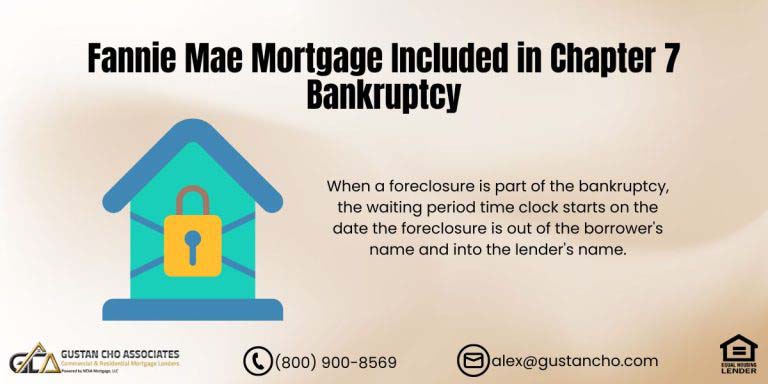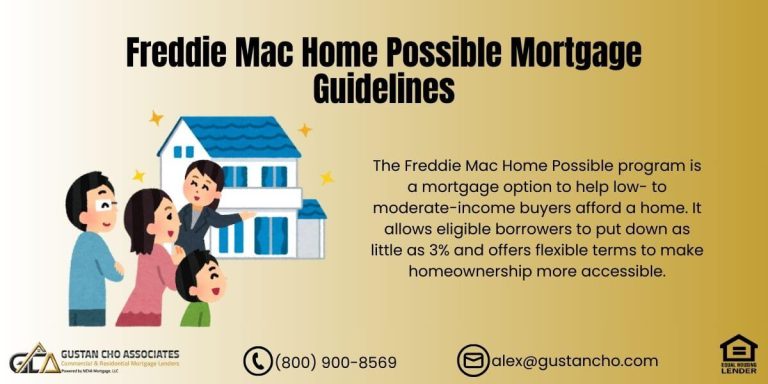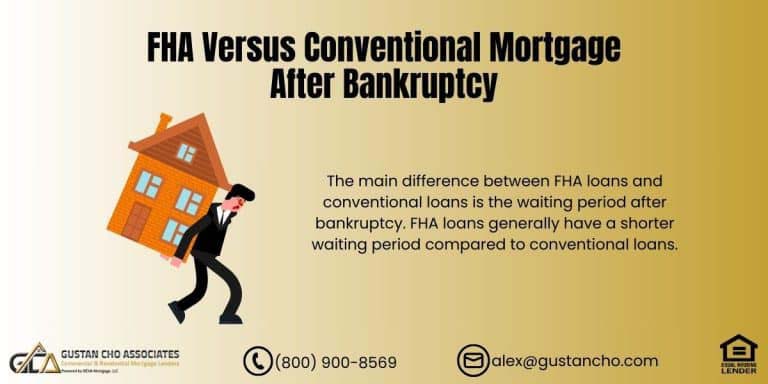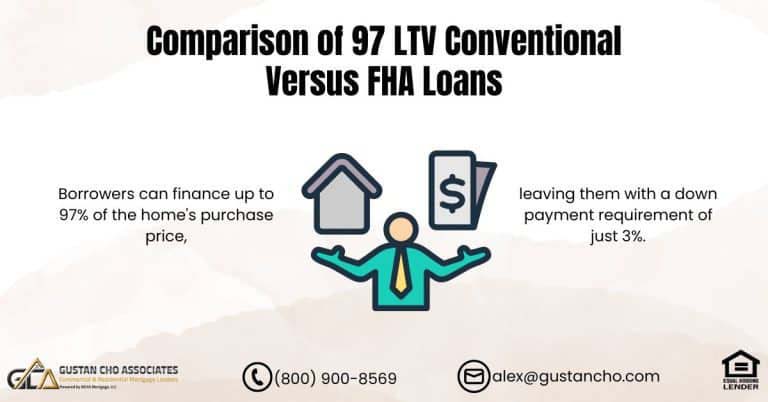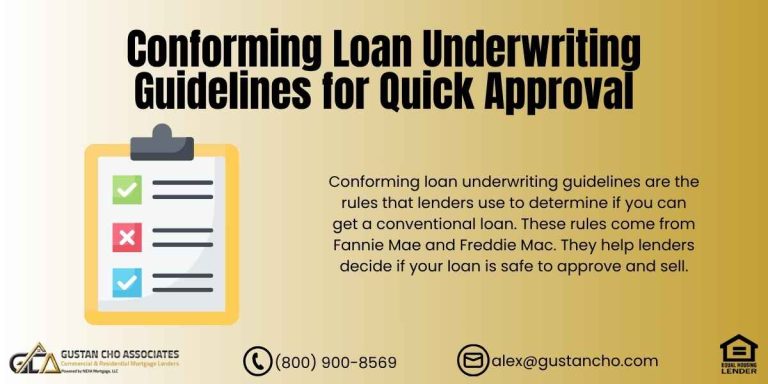In this blog, we will cover and discuss what are conventional loans or conforming mortgages and their benefits. Many home buyers often are not familiar with the various different mortgage options they have to choose from. However, which mortgage option is the best for them?
One of the most common frequently asked questions we get asked daily at Gustan Cho Associates is what are conventional loans and conforming mortgages.
All people know is conventional loans are the most popular loans in the nation. Many borrowers are under the assumption you need perfect credit to qualify for conventional loans. In the following paragraphs, we will cover what are conventional loans.
What Are Conventional Loans? Why Are Conventional Loans Called Conforming Mortgages
Conventional loans are often referred to as conforming loans because conventional loans need to conform to Fannie Mae and/or Freddie Mac guidelines. Fannie Mae and Freddie Mac are the two largest buyers of mortgages in the secondary market. These two GSEs will not purchase mortgages that do not conform to Fannie Mae and/or Freddie Mac Guidelines. This is why conventional loans are called conforming mortgages.
What Are Conventional Loans Versus Conforming Loans
Conforming Loans are also called conforming loans because they must conform to Fannie Mae and/or Freddie Mac mortgage lending guidelines. Fannie Mae and Freddie Mac are the two mortgage giants in the United States and are in charge of setting conforming mortgage lending standards. For banks and mortgage bankers to be able to sell the conventional loans they originate on the secondary market, the loans they originate, process, underwrite, and fund need to conform to Fannie Mae and/or Freddie Mac Standards. In this article, we will discuss and cover Conventional Versus Government Loans.
Conventional Loans Made Simple
Perfect for buyers with steady income and good credit.
How Does The Secondary Mortgage Bond Market Work?
This is how the secondary market works:
- banks and lenders use their warehouse lines of credit
- they fund loans they originate and need to sell these loans on the secondary market
- They need to sell these loans in order for them to relieve the warehouse lines of credit
- This is so they can originate more loans
In order for the Fannie Mae and Freddie Mac to be able to purchase the loans banks and mortgage bankers originate and fund, every single of these loans needs to meet Fannie Mae and/or Freddie Mac guidelines.
Mortgage Lending Guidelines For Conventional Loans
Lending guidelines for conventional loans are the following:
- The borrower needs a minimum of 620 credit scores
- Maximum debt to income ratio cannot exceed 50% debt to income ratio
- Minimum 4-year waiting period after Chapter 7 bankruptcy, short sale, and deed in lieu of foreclosure
- Minimum 7-year waiting period after the recorded date of the foreclosure
- Two-year waiting period after Chapter 13 Bankruptcy discharged date
Four year waiting period after Chapter 13 dismissal date.
Types of Properties That Qualify For Conventional Loans
Homebuyers can qualify single-family homes, condominiums, townhomes, two to four-unit multi-family homes with conventional loans. Owner-occupied homes, second homes, and investments homes can get financing with conventional loans. All condos need to be warrantable condos. Non-warrantable condos and condotels are not eligible for conforming mortgage financing.
Down Payment Requirements on Conventional Loans
First time home buyers can qualify for a 3% to 5% down payment home purchase conventional loans with Fannie Mae. Freddie Mac allows a 3% down payment home purchase conventional loans for homebuyers who have not owned a property for the past three years. Homebuyers can qualify for a second home or vacation home conventional loans with a 10% down payment. Investment homes require a 15% to 25% down payment depending on the property type.
Using Rental Income As Qualified Income
Borrowers who need to use potential rental income to qualify for an investment property conventional loan here is what is required:
- need to put a 25% down payment
- have a 75% loan-to-value
- can use 75% of the potential rental income to qualify for an investment property conventional loan
- property may need to be appraised
- a lease may be required
First-Time Buyer or Seasoned Homeowner?
Conventional loans fit a wide range of borrowers and properties.
Waiting Period After Bankruptcy and Foreclosure For Conventional Loans
We covered the basics of the waiting period after bankruptcy and foreclosure to qualify for conventional loans. However, there are certain rules and regulations with regards to qualifying for conventional loans after bankruptcy and foreclosure. Borrowers with a prior mortgage part of bankruptcy, the waiting period is four years from the discharged date of bankruptcy.
When Does The Waiting Period Start After a Mortgage Included in Bankruptcy
The housing event or foreclosure can be recorded after the discharge date of Chapter 7 Bankruptcy. This new Fannie Mae mortgage guidelines became effective last August 2014. Also, the conventional loan program where borrowers can qualify for a conventional loan of 2 years after a deed in lieu of foreclosure and/or short sale with 20% down payment is no longer in effect as of August of 2014. New Fannie Mae guidelines to qualify after a deed in lieu of foreclosure and/or short sale is now four years from the recorded deed in lieu of foreclosure and/or date of the short sale reflected on the HUD Settlement Statement. 3% to 5% down payment is required on purchases with conforming loans.
According to FHFA and the GSEs, the official 2025 conforming loan limits for one-unit homes are $806,500 (Baseline) and $1,209,750 (high-cost ceiling).
What Are Conventional Loans
What are conventional loans? A plain-English guide to conventional mortgages: how they work, 2025 loan limits ($806,500 baseline; $1,209,750 high-cost), credit score and DTI requirements, down payment options as low as 3%, PMI rules, property types, and when conventional beats FHA, VA, or USDA. Learn how to qualify fast and compare fixed-rate vs. ARM options for one- to four-unit homes. Get expert help and competitive rates with no lender overlays.
Conventional Loans at a Glance
Conventional mortgages are home loans not insured by a government agency (FHA, VA, USDA). Most conventional loans follow Fannie Mae and Freddie Mac rules so lenders can sell them to the GSEs. They are the most common mortgages for first-time buyers, move-up buyers, second homes, and investment properties.
Conforming vs. Non-Conforming
- Conforming: Meets GSE rules (including loan limits).
- Non-conforming (Jumbo): The loan is too big or doesn’t meet GSE rules.
How Conventional Loans Work
You pick a fixed-rate (often 15 or 30 years) or an ARM (fixed for a set time, then adjusts regularly). The bank sets your rate based on your credit score, down payment, debt-to-income (DTI) ratio, loan type, occupancy, and any points you want to pay.
Key Benefits
PMI drops when you hit 20% equity, and that’s not often the case for FHA loans, where mortgage insurance can last the full loan.
- Property Types Are Flexible: You can get a loan for your main home, a second home, or an investment property.
- Many terms and pricing choices are available so you can design the loan that fits your budget.
2025 Conforming Loan Limits (1–4 Units)
- For a one-unit property, the basic limit is $806,500 and the high-cost cap is $1,209,750.
- Bigger properties get higher caps: 2-unit: $1,032,650 / $1,548,975.
- 3-unit: $1,248,150 / $1,872,225.
- 4-unit: $1,551,250 / $2,326,875.
- Some counties sit between the basic and high caps.
- Check your county on the FHFA map.
Minimum Requirements (Typical)
- Credit Score: Most programs want 620 or higher.
- 740 or above usually gets the best rates.
- Down Payment: 3% is the starting point for some first-time buyers and certain income-limited options.
- 5%–20%+ is common for standard buys.
- 15%–25% for some investment loans.
- Debt-to-Income (DTI): Automated underwriting typically prefers a DTI of 45% or lower. However, it may pass on higher ratios if other strengths balance it.
Reserves & Documentation
Certain cases require cash reserves (mandatory for multi-units, second homes, or investment properties) and full verification of income and assets.
Mortgage Insurance (PMI) on Conventional Loans
A down payment of less than 20% triggers PMI, which you can cancel when your balance hits 80% loan-to-value. You can also request early removal if a new appraisal shows sufficient equity. Servicers must drop PMI automatically at 78% LTV on the payment schedule.
Eligible Properties & Occupancy
- Primary Residence: 1 to 4 units.
- Second Home: Usually, it is one unit, must be a reasonable distance from the primary, and must be occupied for a minimum number of days.
- Investment: 1 to 4 units, with stricter down payment and reserve requirements.
Conventional vs. FHA, VA, and USDA
- FHA: More lenient credit and DTI, but carries lifelong mortgage insurance; great for minor credit dings.
- VA: Zero down for qualifying veterans and active service members; very powerful benefit.
- USDA: Zero down in designated rural areas with income limits.
- Conventional: Ideal for strong credit, PMI removal, or second and investment property options.
Smart Financing Starts Here
From single-family homes to condos, conventional loans keep costs low.
When a Jumbo (Non-Conforming) Makes Sense
Loans that exceed the county’s conforming limits are treated as jumbo. These loans have stricter credit, reserves, and down payment guidelines.
Steps to Qualify Quickly
- Gather Documents & Goals: Know payment range, cash needed, and timeline.
- Run DU or LPA: Use Desktop Underwriter® or Loan Product Advisor®.
- Compare Loan Options: Look at points vs. rate, fixed vs. ARM, and mortgage insurance choices.
- Lock Rate and Document: Confirm income and assets, then clear any conditions.
- Get Appraisal & Title: Check home value, clear liens, and agree on closing costs.
- Close Loan: Review Closing Disclosure, sign documents, and fund the loan.
FAQs: What Are Conventional Loans
What is a Conventional Loan?
It’s a mortgage not insured by FHA, VA, or USDA and is usually sold to Fannie Mae or Freddie Mac.
What Are the 2025 Conforming Limits For 1-Unit Homes?
The Baseline is $806,500; The High-Cost Ceiling is $1,209,750, But Limits Vary by County.
What Are the 2025 Limits For 2-4 Unit Homes?
Here Are The Baseline and High-Cost Ceiling Limits: 2-unit $1,032,650 / $1,548,975, 3-unit $1,248,150 / $1,872,225, and 4-unit $1,551,250 / $2,326,875.
What Credit Score is Needed?
Most lenders require a score of 620 or higher; a higher score can lower your rate.
How Low Can The Down Payment Be?
It can be 3% for qualifying first-time buyers. Otherwise, it ranges from 5% to 20% or more.
Is PMI Required?
Yes, if your down payment is less than 20%. The good news is that PMI can be removed once you have 20% equity.
Can I Use a Conventional Loan for a Vacation Home or Rental House?
Definitely! Conventional loans can finance a **vacation home and a rental property.
What’s the DTI Requirement?
Most automated systems prefer a DTI under 45%. A stronger profile might stretch that a little.
What if My Purchase Price is Over the County Limit?
You’ll probably need a jumbo loan, which is non-conforming.
How Do I Find My County’s Loan Limit?
Check the FHFA county loan-limit map for the most accurate numbers.
Student Loan Guidelines on Conventional Loans
Income-Based Repayment (IBR) is allowed on conventional loans. However, IBR payments need to report to all three credit bureaus. If IBR payments are not reporting on credit bureaus, loan officers can do a rapid rescore/credit supplement. This normally takes 3 to 5 business days. Borrowers with higher student loans can contact us at Gustan Cho Associates to qualify for conventional loans with no overlays at 800-900-8569 or text us for a faster response. Or email us at gcho@gustancho.com. Gustan Cho Associates has a national reputation for its no lender overlays on government and conventional loans.
Denied Elsewhere? We Can Help
We approve conventional loans other lenders can’t.




